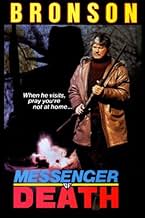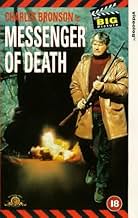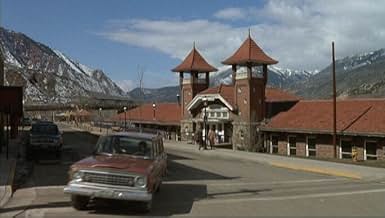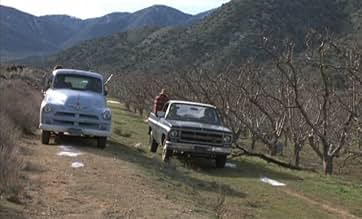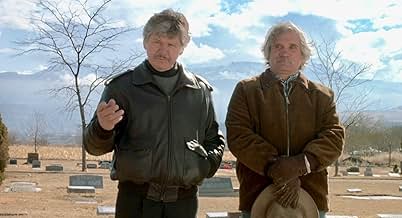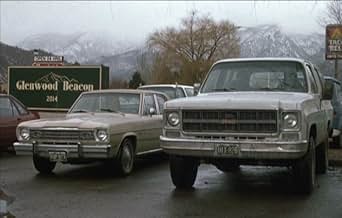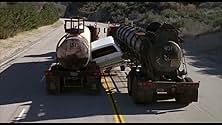NOTE IMDb
5,4/10
3,6 k
MA NOTE
La femme et les enfants d'un mormon sont assassinés. Alors que tout laisse penser que le mobile est religieux, des motifs économiques pourraient bien expliquer ces meurtres.La femme et les enfants d'un mormon sont assassinés. Alors que tout laisse penser que le mobile est religieux, des motifs économiques pourraient bien expliquer ces meurtres.La femme et les enfants d'un mormon sont assassinés. Alors que tout laisse penser que le mobile est religieux, des motifs économiques pourraient bien expliquer ces meurtres.
- Réalisation
- Scénario
- Casting principal
Avis à la une
The film has Charles Bronson in its favor, and is fairly well-made. It'a a little unbelievable, but fans of the genre or Bronson should enjoy it. Basically, Charles Bronson is an investigative reporter who investigates the slaying of a man's family, originally under the impression that the slaying was due to religious differences. One thing of minor note...it's not really a feud between different Mormon sects. The LDS Church has banned polygamy, in accordance with federal law, and excommunicates members who practice it. I suppose some might say that all the break-off groups(like the RLDS, FLDS and polygamist clans) can be considered part of a Mormon Religious Umbrella....but that would be kind of like saying members of the Russian Orthodox Church are really Catholic.
Try and beat THIS for an opening sequence! Images of women amiably chatting and young children peacefully playing in the morning sun get barbarically interrupted when suddenly a shady figure holding a shotgun comes driving up to the house. Without speaking one word, the man unhesitatingly butchers the women (one pregnant one) before turning towards the children and shooting them too. The latter killings occur off screen but the footage is nonetheless shocking considering the madman's emotionless modus operandi. This bit of content represents the promising beginning of a compelling and highly suspenseful albeit flawed thriller starring the almighty Charles Bronson in an unconventional (at least, for him) role. Charlie depicts a journalist of the Denver newspaper who sinks his teeth into the circumstances surrounding the tragic massacre and stumbles upon a story bigger than he bargained for. The murders initially appear to be a dramatic consequence of a long-running vendetta between a separated family of Mormons, but our courageous reporter gradually uncovers a convoluted and inhumanly cruel conspiracy which concerns of course eminent politicians and wealthy businessmen. I honestly expected to find a slightly higher rating and more positive-toned reviews for "Messenger of Death" around here to be honest. Admittedly the evolution of the storyline is rather predictable and the eventual settlement is too tame, but the film definitely maintains a high tempo and a good number of sequences are very tense and literally action-packed. Charles Bronson tries his hardest to come across as a plausible journalist, but there are definitely some problems regarding his character. Bronson isn't exactly known as the most talkative actor in Hollywood; a trademark that usually fits his regular roles of mercenaries ("The Mechanic", "Violent City") and tormented avengers (the "Death Wish" franchise) very well. But even here his number of speeches and dialogs are kept to an absolute minimum, which isn't normal when you're a reporter. Moreover, in spite of his 'normal' job and life-style, he still wipes the floor with professional hit men and stunt-drives his way out of an assassination attempt! Since when do Denver journalists receive training in martial arts and defensive driving? The remote Colorado filming locations, as well as the largely unfamiliar traditions of Mormon families, add up to the ominous atmosphere but still director J. Lee Thompson ("Cape Fear", "The Guns of Navarone") doesn't use up the full potential of these terrific. "Messenger of Death" is an interesting film, to say the least, and it deserves a bit more appreciation from Bronson fanatics as well as fans of suspense films in general.
Charles Bronson plays investigative reporter Garret Smith for the Denver Tribune in this motion picture about a blood feud between two brothers, of different Mormon sects. With outside political as well as economic overtones.
A decent story about religious jealousy and the behind the scenes politics of exploiting it. The feud between brothers Willis, Jeff Corey, and Zenas, John Ireland, Beecham is instigated when Willis' son's Orville's, Charles Dierkop, family is massacred. Willis believes that it was the work of Zenas and starts an all out war against his brother which ends with both brothers getting killed. But there's something else that has nothing to do with the feud between the brother's that's central to the story: A lake of artesian water under brother's Zenas' property that can be used to turn common and plentiful shale into valuable and scarce fuel oil.
Charles Bronson is still believable, at age 67, as the tough reporter that gets to the bottom of the story with his fists as well as his typewriter to uncover the truth about Orville's family being murdered. As well as who ordered it that instigated a war between his father and uncle and why.
With the exception of the beginning the movie "Messenger of Death" cuts down on the violence and concentrated more on the story which made the movie more interesting to watch. And also gave the audience more time to think who's behind the murders that happened to the Orville Beecham family which built up to a better then average ending.
The ending of "Messenger of Death" though a bit contrived and what seemed forced still tied the story together and made it believable. One of Charles Bronson's best later efforts when he was still effective as an action hero, or in this case an action reporter, on the screen.
A decent story about religious jealousy and the behind the scenes politics of exploiting it. The feud between brothers Willis, Jeff Corey, and Zenas, John Ireland, Beecham is instigated when Willis' son's Orville's, Charles Dierkop, family is massacred. Willis believes that it was the work of Zenas and starts an all out war against his brother which ends with both brothers getting killed. But there's something else that has nothing to do with the feud between the brother's that's central to the story: A lake of artesian water under brother's Zenas' property that can be used to turn common and plentiful shale into valuable and scarce fuel oil.
Charles Bronson is still believable, at age 67, as the tough reporter that gets to the bottom of the story with his fists as well as his typewriter to uncover the truth about Orville's family being murdered. As well as who ordered it that instigated a war between his father and uncle and why.
With the exception of the beginning the movie "Messenger of Death" cuts down on the violence and concentrated more on the story which made the movie more interesting to watch. And also gave the audience more time to think who's behind the murders that happened to the Orville Beecham family which built up to a better then average ending.
The ending of "Messenger of Death" though a bit contrived and what seemed forced still tied the story together and made it believable. One of Charles Bronson's best later efforts when he was still effective as an action hero, or in this case an action reporter, on the screen.
Easily skip-able Charles Bronson movie that starts out strongly but doesn't follow through. He unconvincingly plays a Denver reporter covering a case of a Mormon family living in the Colorado mountains who had nine members massacred, including five children. He then sets out to find the killer by visiting the eccentric community and finds that much of the evidence leads to a family feud between two brothers, along with ties to a water company. Why Chuck's character would feel so personally bent on dealing out vengeance when it's not his own flesh and blood didn't ever strike me as authentic. J. Lee Thompson directs (as usual) and manages to serve up some pretty scenery along with a good cast including John Ireland and Jeff Corey, but this is rather weak tea. ** out of ****
A movie where Charles Bronson doesn't kill anyone. Despite the title. Despite the poster or the video cover. There are indeed deaths, in a Mormon family, where children and women are massacred (this is the beginning of the film). Charles Bronson is a journalist who investigates to understand why a family of Mormons has been decimated. He conducts the investigation on his own, at his own pace, independently of the police, supported by his newspaper, which wants to create a sensation.
The documentary side of the film presents us with the thought patterns of these Mormons, where God's will (which explains everything) and vengeance go hand in hand, in a country where guns are freely available. The messenger of death is the killer who decimated the family, unrelated to the character of Charles Bronson who investigates. Or, the journalist through his investigation, who will indirectly provoke reprisals between Mormon families.
Another interesting element of the film is the natural settings of Colorado. Let's add a superb music that can make us think of a horror movie: the composer, Robert O. Ragland is unknown to us, but has signed many film scores. This one is interesting, because it suits the suspense and horror.
The film ends with evil capitalists and politicians greedy for money.
The film can be watched without any problem. The scenes in the city (Denver, the capitalists, the important people) are the perfect counterpoint to the scenes in the countryside where Charles Bronson investigates and ends up putting the pieces of the puzzle together in the Mormon farms.
The documentary side of the film presents us with the thought patterns of these Mormons, where God's will (which explains everything) and vengeance go hand in hand, in a country where guns are freely available. The messenger of death is the killer who decimated the family, unrelated to the character of Charles Bronson who investigates. Or, the journalist through his investigation, who will indirectly provoke reprisals between Mormon families.
Another interesting element of the film is the natural settings of Colorado. Let's add a superb music that can make us think of a horror movie: the composer, Robert O. Ragland is unknown to us, but has signed many film scores. This one is interesting, because it suits the suspense and horror.
The film ends with evil capitalists and politicians greedy for money.
The film can be watched without any problem. The scenes in the city (Denver, the capitalists, the important people) are the perfect counterpoint to the scenes in the countryside where Charles Bronson investigates and ends up putting the pieces of the puzzle together in the Mormon farms.
Le saviez-vous
- AnecdotesDirector J. Lee Thompson fell ill during the making of this film, the picture was finished by second unit director, Robert C. Ortwin Jr..
- GaffesDuring the car chase, Smith's car is on the inside of one of the tankers on the first corner out of the tunnel, but in the next shot it's back in the middle of both tankers.
- Citations
Garret Smith: [punching the assassin] Bastard child killer!
- Versions alternativesAlmost 5 minutes were cut in Finland for VHS distribution. Later released on DVD as uncut.
- ConnexionsReferenced in DVD/Lazerdisc/VHS collection 2016 (2016)
Meilleurs choix
Connectez-vous pour évaluer et suivre la liste de favoris afin de recevoir des recommandations personnalisées
- How long is Messenger of Death?Alimenté par Alexa
Détails
Box-office
- Montant brut aux États-Unis et au Canada
- 3 074 681 $US
- Week-end de sortie aux États-Unis et au Canada
- 1 035 279 $US
- 18 sept. 1988
- Montant brut mondial
- 3 074 681 $US
- Durée1 heure 31 minutes
- Couleur
- Mixage
- Rapport de forme
- 1.85 : 1
Contribuer à cette page
Suggérer une modification ou ajouter du contenu manquant

Lacune principale
By what name was Le Messager de la mort (1988) officially released in India in English?
Répondre

